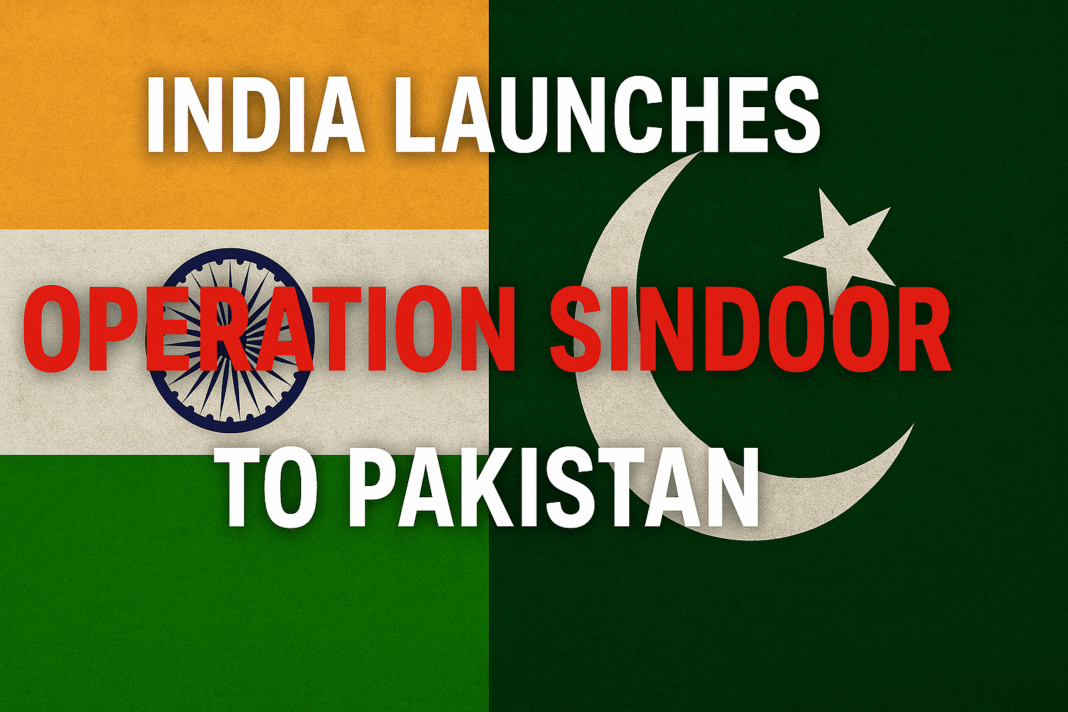Tensions between India and Pakistan have dangerously escalated following the April 22 terrorist attack in Pahalgam, Indian-administered Kashmir, which killed 26 civilians—most of them Hindu pilgrims. India, citing Pakistan-based militant involvement, has launched a series of missile strikes, triggering heightened alerts across both countries and international concern over the risk of full-scale conflict between the two nuclear-armed nations.
India Launches “Operation Sindoor” Targeting Alleged Terror Bases
India confirmed the launch of Operation Sindoor on May 6, striking what it described as terror infrastructure in nine locations across Pakistan and Pakistan-administered Kashmir. The action, according to the Indian government, was a direct response to the Pahalgam massacre and focused on launchpads allegedly used to coordinate the attack.
“Justice is served,” the Indian Army posted in a terse message following the strikes. According to the Indian government, cited by AP News, the operation did not target any Pakistani military facilities and was aimed solely at “eliminating terror safe havens.”
The locations hit reportedly included Kotli, Muzaffarabad, Ahmedpur East, Bagh, and Muridke—some in Punjab, others in the Pakistan-administered part of disputed Kashmir.
Pakistan Confirms Missile Strikes, Reports Civilian Casualties
Pakistan’s military confirmed that Indian missiles struck five areas, resulting in multiple civilian casualties.
“Five places—Kotli, Ahmedpur East, Muzaffarabad, Bagh, and Muridke—have been attacked,” said Lt. Gen. Ahmed Sharif Chaudhry, Pakistan’s military spokesperson. “Two civilians were killed in Kotli, and one child was killed and 12 injured in Ahmedpur East.” According to Geo News, cited by Arab News, Chaudhry emphasized that Pakistani fighter jets had scrambled in response, though no Indian aircraft entered Pakistani airspace.
In a separate interview with ARY News, also reported by Arab News, Chaudhry warned: “Let me say unequivocally that Pakistan will respond at a time and place of its own choosing. This cowardly attack—this heinous provocation—will not go unanswered.”
A security official, speaking anonymously to local media, claimed the Pakistan Air Force shot down two Indian aircraft, although the Pakistani military has not officially confirmed this claim.
Strategic and Symbolic Targets
The targeted areas are significant. Muridke, located in Punjab, is widely believed to house Lashkar-e-Taiba’s headquarters, the group India blames for numerous attacks. Kotli, Bagh, and Muzaffarabad lie within Azad Kashmir—governed by Pakistan but claimed by India—while Ahmedpur East is a historic city in southern Punjab.
According to India’s Ministry of External Affairs, cited by The Times of India, the strikes were aimed at preventing further cross-border attacks. However, no evidence of Pakistan’s involvement in the Pahalgam attack has been publicly released.
International Diplomacy Urges Restraint
The United Nations Security Council held an emergency closed-door session on May 5 to discuss the crisis.
“It is essential to avoid a military confrontation that could easily spiral out of control,” said UN Secretary-General António Guterres, who offered to mediate. According to the UN Secretariat, reported by Security Council Report, calls for de-escalation and dialogue were unanimously supported during the session.
Meanwhile, Iran’s Foreign Minister Abbas Araghchi arrived in Islamabad on May 5 to urge restraint and announced plans to visit New Delhi on May 8. Both Turkey and China have also expressed concern over the rapid escalation.
Regional Uncertainty Amid Nuclear Shadow
The April 22 attack in Pahalgam, Kashmir, has become one of the deadliest on civilians in over two decades. India has linked it to The Resistance Front, an offshoot of Lashkar-e-Taiba, while Pakistan has categorically denied involvement, arguing that Indian claims are unfounded and politically motivated.
According to The Guardian, both countries are now engaged in heightened military readiness. Civil defense drills have been reported in over 200 Indian cities, and Pakistan has closed over 1,000 religious schools in Azad Kashmir as precautionary measures.
Outlook: War or Dialogue?
While India has not commented further on its next steps, former Army officials in both nations have warned of a possible broader conflict.
“This is the most serious escalation since the 2019 Balakot airstrikes,” said Lt. Gen. Arun Kumar Sahni (Retd), cited by The Times of India. “If war breaks out, we must be prepared. India will deliver a strong response.”
(With inputs from news agencies)
A global media for the latest news, entertainment, music fashion, and more.














